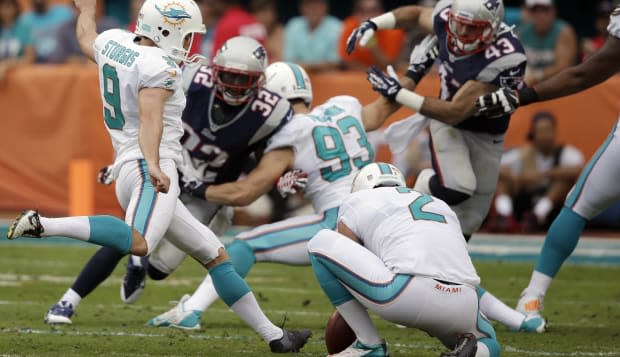Miami Dolphins Scout Tending Ill Wife Moves to Sue After Firing

Maybe the Miami Dolphins should get some HR advice from the New York Mets.
This week, the hapless NFL team was back in the headlines for the wrong reasons for the third time this year, when a Dolphins scout alleged the organization fired him for working from home because he needed to tend to the health of his wife, who suffers from cystic fibrosis.
The scout, Nate Sullivan, had worked for the Dolphins for 17 years -- the past decade remotely -- for a trio of the team's general managers. But in January the team hired a new GM, Dennis Hickey, and the perspective changed. Sullivan, who was fired May 12, claims he was told by Hickey at his termination meeting that the arrangement "just doesn't work for [me]."
This latest revelation comes after a pair of other embarrassing stories: The intense bullying and harassment of offensive lineman Jonathan Martin, which caused him to leave the team in despair and led to the suspension of another offensive lineman Richie Incognito.
Then, earlier this month, Dolphins' defensive back Don Jones was fined and banned from team activities following two tweets slamming Michael Sam when the NFL's first openly gay player was drafted by the St. Louis Rams.
If there was any doubt that the Dolphins were out to get Sullivan because of his wife's health problems, his attorney claims that earlier this year the organization changed its healthcare plan's insurance so it no longer covered cystic fibrosis medication. This raised the prescription price nearly $3,000 per pill, Sullivan's attorney claims.
Still, there are a few key unanswered questions, says workplace strategist and author Cali Yost, after acknowledging the team's "tone-deafness."
"The question really is 'What was he not doing well with the former flexible work schedule in place'"? Yost asks. "It's interesting that the three [previous] bosses supported it. Did his performance change? Was there no other job at the organization for him?"
Yost says this is a situation any remote employee can face under a new boss or leadership regime and that the best defense is to "write up a document that clearly lays out what you're doing, when you're doing it, how you're going to communicate, and how you get the job done."
That way, when the new boss comes in, you can sit down with him or her and go over the list and sense if there is any resistance. If there is, the best way to approach the conflict is to say, "Let's try this, it's been working, and in three-four months we can discuss again and see if we need to adjust."
This way, Yost points out, even a boss who thinks the situation "just doesn't work for me," gets a chance to see how the experience is actually playing out, but also leaves the door open to make changes if necessary.
"In most cases, the new boss comes in and there's no formal plan, nothing's written out, they have only hearsay and no experience," Yost says. "If you don't have a plan in place, it could be very difficult to keep the conversation going."
Yost cautions companies that as the nation ages, more and more situations like Sullivan's are going to arise, and they need to be prepared for it.
"Right now, there are 5.1 people under 65 to take care of every person over 65," Yost points out. "By 2050, there will be 2.9 working people to take care of every person over 65. [Sullivan's] situation is going to become increasingly common."
Companies that react the way the Dolphins did, Yost says, are "short-sighted," because it can "cause an organization to lose good people." And not just the people who work from home, but other valuable employees who see attitudes change towards co-workers "and decide that it isn't a place they want to work anymore."
Moreover, Yost says, citing a research study by ORC International, while 97% of full-time US workers said they had some kind of flexibility in their job, only 40% said they got any kind of training on how to work that flexibility effectively.
"Part of the broader issue here may be that we're just not teaching people how to [work remotely] well," Yost says. "We have to teach our employees to do this effectively, so it meets both their needs and the needs of the business."
The Dolphins have not yet commented on Sullivan's lawsuit.

